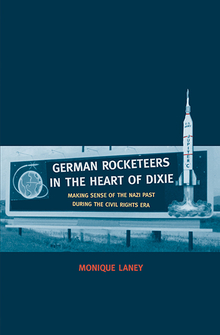German Rocketeers in the Heart of Dixie
WARNING
You are viewing an older version of the Yalebooks website. Please visit out new website with more updated information and a better user experience: https://www.yalebooks.com
Making Sense of the Nazi Past during the Civil Rights Era
Monique Laney
This thought-provoking study by historian Monique Laney focuses on the U.S. government–assisted integration of German rocket specialists and their families into a small southern community soon after World War II. In 1950, Wernher von Braun and his team of rocket experts relocated to Huntsville, Alabama, a town that would celebrate the team, despite their essential role in the recent Nazi war effort, for their contributions to the U.S. Army missile program and later to NASA’s space program. Based on oral histories, provided by members of the African American and Jewish communities, and by the rocketeers’ families, co-workers, friends, and neighbors, Laney’s book demonstrates how the histories of German Nazism and Jim Crow in the American South intertwine in narratives about the past. This is a critical reassessment of a singular time that links the Cold War, the Space Race, and the Civil Rights era while addressing important issues of transnational science and technology, and asking Americans to consider their country’s own history of racism when reflecting on the Nazi past.
Monique Laney is assistant professor of history at Auburn University. She lives in Auburn, AL.
“Laney, a daughter of Alabama and Germany, has produced an insightful, nuanced study of a unique historical phenomenon: the moral and cognitive dissonance that ensues when former agents of the Third Reich are transplanted to a segregated southern community and charged with winning the Cold War space race.”—Diane McWhorter, Pulitzer Prize–winning author of Carry Me Home
“Much has been written about the German-American rocket engineers led by Wernher von Braun. But Monique Laney’s important, original and well-written book opens a new dimension: how they were integrated into Huntsville during the Civil Rights era and what that tells us about how that city processed, or did not process, their Nazi past while grappling with Alabama’s shifting racial climate. Her work makes especially noteworthy contributions to history of “transnational memory,” but it will also intrigue a wide variety of readers and scholars interested in space history, the history of technology, Southern history, immigration, social history and American Studies.”—Michael J. Neufeld, author of Von Braun
“Laney’s important, original and well-written book shows how Huntsville processed, or did not process, the German rocketeers’ Nazi past while grappling with Alabama’s shifting racial climate during the Civil Rights era.”—Michael J. Neufeld, author of Von Braun
“That the engineers who helped lift the United States into outer space were complicit in the cruelty of the Third Reich is the paradox at the heart of Monique Laney’s fascinating book. Her moral concern drives a superb work of ethnography as well as history.”—Stephen J. Whitfield, Brandeis University
“This book explains how the Huntsville community wrestled with historical memory, denying, rationalizing, or confirming past atrocities for self-preservation, civic boosterism, or ethnic identity.”—Wayne Flynt, author of Alabama in the Twentieth Century
“A sparkling migration history, Laney’s rich ensemble of oral histories and thoughtful analysis recreates the complexities of life and labor in the post-war Southern community where rocket experts sought to reconcile identities past and present.”—Alan Kraut, author of Silent Travelers
“What makes this book so important is the access to oral history and personal materials from the Huntsville German community. A tremendously solid piece of scholarship.”—James R. Hansen, Auburn University
“Laney's perceptive analysis examines the shared basis for Nazi rocket scientists and Jim Crow townspeople to form a cosy community, expanding the local to a national technology narrative.”—Dirk Hoerder, Arizona State University
“This richly documented study of postwar migration and memory illuminates the history of a town integrated and divided under the long shadows of Nazism and racism.”—Alexander Freund, University of Winnipeg
“In 1950, more than 100 German rocket experts, many with a Nazi past, settled in Huntsville, Alabama. Reinventing themselves and their families in the Jim Crow-era American South, they transformed a backwater town into ‘Rocket City, USA’. Ten years later, these space personae had fully integrated and become highly admired citizens, with Cold War techno-celebrity Wernher von Braun as the town’s national and international figurehead. Based on more than 70 oral history interviews, Monique Laney’s study analyzes the making and dismantling of a community whose memories transcended national borders. Located at the intersection of migration history, memory studies and space history, German Rocketeers in the Heart of Dixie is fascinating, rich and timely.”—Alexander C.T. Geppert, New York University
“This study is a call for Americans to be honest about confronting their past in all its complexity and to understand the dangers of their failure to do so.”—Choice
“Laney observes with insight and sensitivity that Vergangenheitsbewältigung—modern Germany’s effort to come to terms with its egregious history—is relevant to her Alabama findings.”—Jack Glazier, Journal of American History
“German Rocketeers in the Heart of Dixie succeeds because it is an exposition on memory. Laney avoids potential pitfalls by placing her emphasis on collecting and analyzing memories and embracing ambiguities.”—Layne Karafantis, Quest: The History of Spaceflight Quarterly
“[German Rocketeers] offers a very precise description of the memory culture of Huntsville, Alabama, with regard to its immigrants from Nazi Germany. Laney’s interviews are as interesting as her analysis of mnemonic communities is compelling.”—David Jünger, H-Net Reviews
"German Rocketeers in the Heart of Dixie offers a solid contribution to the post-World War II history of Alabama. It could serve as a very good conversation starter and a learning tool for graduate colloquiums. For scholars of the history of Alabama, the Sun Belt, the German-American experience, and immigration, this book is a must."—Marko Maunula, Alabama Review
"Well-written and carefully argued book." —Mark Walker, Isis
Winner of the American Institute of Aeronautics and Astronautics 2016 Gardner-Lasser Aerospace History Literature Award.
Won honorable mention for the Deep South Book Award sponsored by the Frances S. Summersell Center.
ISBN: 9780300198034
Publication Date: June 23, 2015
Publication Date: June 23, 2015
320 pages, 6 1/8 x 9 1/4
5 b/w illus.
5 b/w illus.








